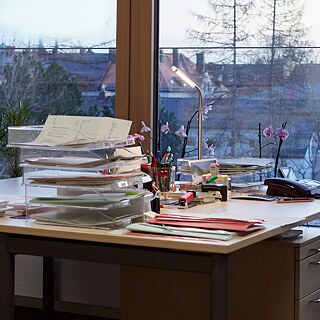My workplace
Employee protection
In Germany, employee protection policies are in place to ensure that companies follow certain rules regarding health and safety for their employees. These may include certain workwear, regular breaks and working hours. Large companies have an employee representation body, a works council (Betriebsrat). If you have a problem, you can speak to the works council. The works council will then speak to your superior.
Labour law: working hours, holiday and illness
Your working hours depend on your profession and your employment contract (see section Starting work). For instance, if you’re a nurse in a hospital, you will work shifts. Sometimes you will work in the mornings, sometimes in the evenings or at night.
In an office, working hours are usually regulated. You start in the morning and finish your day after eight or nine hours. Many offices offer flexitime, or flexible working hours. For instance, you can begin at 8 or 9 a.m. in the morning and, depending on when you start, leave earlier or later in the evening. You will always have at least one break, often a lunchbreak of 30 or 60 minutes. An increasing number of employers now offer their employees the option to work from home. Normally, you work between 38 and 40 hours per week. It’s also possible to work part-time, for example 50% of a full-time position. That means you work around 20 hours per week. This is useful if you have children or you work part-time for yourself. There is a minimum wage in Germany: employers are not allowed to pay employees less than 12.41 euros per hour (as of 2024).
Every employee has a certain number of holiday days each year. You must actively request holiday and your boss must approve it. You can usually spread your holiday throughout the year and take it whenever you want. However, there may be times when taking holiday isn’t possible because there is too much work to do in the company. Sometimes, you have to take your holiday when the whole company is on holiday. You continue to receive your salary/wages during your holiday.
If you are ill, it’s important you tell your employer immediately and report sick. Typically, employers require a doctor’s certificate after three days of illness (on the fourth day) (see section “Health”). However, some employers may request it earlier. You can visit or call the doctor’s surgery. In most cases, you can report sick over the phone. Your doctor will transfer the sick note digitally to your health insurance. The employer can then view it online. This applies to people with statutory health insurance. If you have private health insurance, you will need the doctor’s certificate in paper form. You must then submit this to your employer yourself.
Workwear
In some professions, such as on construction sites, you’re required to wear special clothing for work to protect you against injury. Or you will wear a uniform, for instance if you work at an airport. You might be asked to wear a T-shirt with your company’s logo on it. This helps customers identify you as an employee.
Notice
If you’re no longer able or no longer wish to work for your company, you have to hand in your notice. This must be done in writing. There is normally a notice period of three months. Your employer can also terminate your employment. They normally also have a notice period of three months. Are you still in the probationary period? During the probationary period, the notice period is usually shorter, typically two to three weeks. If you object to the dismissal, you have three weeks to file an objection.
Has your employer given you your notice, or is your fixed-term employment contract coming to an end? You must register as a jobseeker with the employment agency in good time and then register as being unemployed. You can then apply for unemployment benefit and you will usually receive money. The amount and duration of benefits depend on several factors. However, if you resign voluntarily, the employment agency may impose a waiting period. This means that you will not initially receive unemployment benefit.
Further and continuing education
If you have already completed vocational training or a study programme and have worked for a certain amount of time, you can continue your education. This will deepen, expand and update both your theoretical knowledge and practical skills. If you’re interested in further training, contact the Federal Employment Agency. Adult education centres (Volkshochschulen) also offer a wide range of courses. Companies, too, often offer continuing education opportunities. Ask your employer.
Self-employment
Do you work independently as a freelancer? If so, you have the flexibility to decide when, where and how you work. You can work from home or rent workspace.
Do you want to start a business and hire employees? If so, you must register the business with the tax office and/or trade licensing office. You also need to consider certain rights and obligations (in this section, go to “Employee protection”, “Labour Law: Working hours, holiday and illness” and “Notice”).
Also think about the important types of insurance your company and your employees will need. The business start-up website contains lots of useful information.

